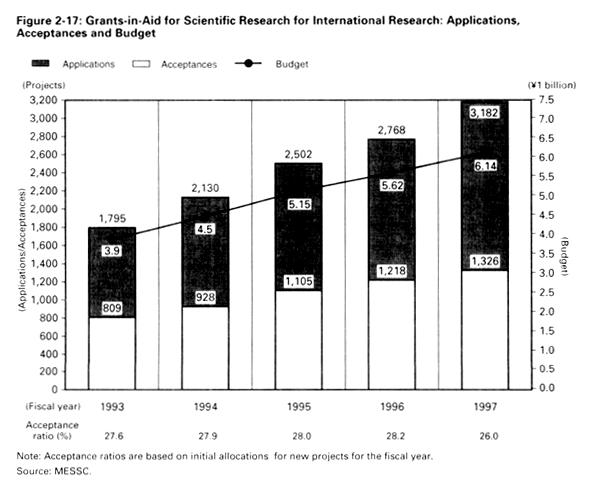| Home > Policy > White Paper, Notice, Announcement > White Paper > JAPANESE GOVERNMENT POLICES IN EDUCATION, SCIENCE, SPORTS AND CULTURE 1997 > Scientific Research Chapter 2 Section 3 3 | ||
Promoting exchange of researchers is one of the most important basic strategies for international scientific exchange, since such activities help to foster trust among individual researchers and lead to joint research in the future. In particular, exchange among young researchers is extremely important because of the potential to foster their creativity and international perspectives while revitalizing the research environment in Japan and overseas. MESSC is conducting the following activities through JSPS as part of its Program to Support 10,000 Postdoctoral Researchers. (See Chapter 2, Section 1, 1(4) ).
(i) Postdoctoral Fellowships for Research Abroad
: Young Japanese researchers are sent on long-term assignments to foreign universities and research institutes ( 100 in FY1996, 125 in FY1997).
(ii) Postdoctoral Fellowships for Foreign Researchers
: Young researchers from other countries are accepted into Japanese universities and research institutes (420 in FY1996, 680 in FY1997).
In addition, JSPS has programs to invite foreign researchers (short-term and long-term). These researcher exchange programs need to be further expanded and improved in the future.
MESSC also operates a short-term research program called Research Experience Fellow ships for Young Foreign Researchers (20 researchers accepted in FY1996, 80 in FY1997). Under this program, young researchers from various countries are accepted into national universities or inter-university research institutes and given the opportunity to participate in joint research for a two-month period during the summer.
Exchanges of scientific information help to stimulate Japanese researchers and provide excellent opportunities to disseminate Japanese scientific information. For these reasons. MESSC subsidizes various related activities, providing, for example, travel grants to researchers attending international symposia held overseas and supporting funds to national universities and inter-university research institutes for organizing symposia in Japan.

The increasing sophistication, scale, and diversity of scientific research are reflected in the growing importance of international cooperation and contribution and in a growing need for international cooperative research under Japanese leadership. MESSC supports cooperative research and field research by university research groups through grants-in-aid for scientific research for international research ( Figure 2-17 ).
Related activities include joint research projects and scientific seminars conducted by JSPS under its program of international cooperation for advanced research, which targets the United States, the United Kingdom, Germany, and France, and under the Japan-Europe Research Cooperative Program, which covers European countries except the United Kingdom, Germany, and France.
For International research projects that require massive funding and participation by many countries, it is particularly important not only to work closely with other countries, but also to participate
So, in addition to its financial contribution to the construction of the Large Hadron Collider (LHC) by the European Organization for Nuclear Research (CERN), for example, Japan also participates as an observer on the CERN council. In addition, within the scope of domestic scientific interest and technical capability, Japan has also accepted responsibility, from the design stage, for developing important portions of the measuring devices to be used in experiments. This illustrates how Japan can make an international contribution through participation in cooperative research while maintaining Independent involvement from the development stage.
In addition, Japan is building a large-scale optical infrared telescope called Subaru on the peak of Mauna Kea in Hawaii (See Chapter 2, Section 2, 2(e) ). Teaching and clerical staff were assigned to the facility in FY1997. In the future, it will be necessary to consider the role of international exchange support and other programs centering on overseas research facilities such as this.
Promoting scientific exchange with Asian countries is highly significant in that it enables Japanese scientific research to contribute not only to the improvement of scientific research infrastructure in the countries concerned, but also to the solution of shared problems in Asia. The Japan Society for the Promotion of Science is implementing the Core University Program, whereby designated "core universities" in Japan and counterpart countries are paired for joint research in specified fields that reflect the needs of the partner country. With the cooperation of other universities, these core universities carry out organized, inter-university scientific exchange, including joint research and seminars. There is also a program called "RONPAC" to assist prospective doctoral candidates. Under this program, young researchers who wish to obtain a doctoral degree through the submission of a dissertation to a Japanese university are invited to Japan and, when necessary, Japanese university teaching personnel may be sent abroad to provide research guidance.
Fostering international scientific exchange and cooperation not only with Asia and the Pacific, but also with the scientifically advanced countries of Western Europe and North America and with countries in other parts of the world, such as Eastern Europe, will require a wide range of carefully targeted activities, such as joint research, seminars, and personnel exchanges, to ensure a proper response to different countries' situations and needs with respect to scientific research systems and the training of researchers.
| Back to Top | MEXT HOME |